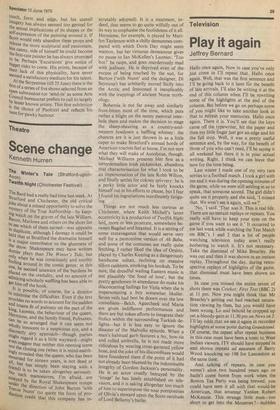Theatre
Scene change
Kenneth Hurren
The Winter's Tale (Stratford-uponAvon)
Twelfth Night (Chichester Festival) The Bard had a really bad time last week.. At Stratford and Chichester, the old critical Joke about a missed opportunity to solve the
YsterY of the True Authorship—by keeping watch on the graves of the late William, Bacon, Marlowe and others on the short list to see which of them turned—was apposite in duplicate, although I daresay it could be
held that at Stratford the dramatist himself IS a major contributor to the glumness of the show. Shakespeare may have written
dottier plays than The Winter's Tale, but Only when he was consciously and nimbly fooling around in the comic genre: in this one, he seemed unaware of the burdens he Placed on the credulity, and no amount of admiring scholarly waffling has been able to get him off the hook. It is possible, of course, for a director to minimise the difficulties. Even if the text Provides no words to account for the sudden an.d insane fit of jealousy on the part of the king, Leontes, the behaviour of the queen, Hermione, and the family friend, Polixenes, can be so arranged that it can seem not Wholly innocent to a suspicious eye, and a dis.creetly airy approach—though purists might regard it as a little wayward—might even suggest that neither this opening scene for the closing one (when it is mind-numbingly revealed that the queen, who has been mourned for sixteen years, is not dead at anll, but has simply been staying with a Inend) is to be taken altogether seriously. 1`10 such manoeuvres, I'm afraid, are essayed by the Royal Shakespeare troupe ,urnder the direction of John Barton 'with drev.or Nunn' (to quote the form of pro uction credit that this company has in
scrutably adopted). It is a treatment, indeed, that seems to go quite wilfully out of its way to emphasise the foolishness of it all. Hermione, for example, is played by Marilyn Taylerson with a chilly demurenes compared with which Doris Day might seem wanton, but her virtuous demeanour gives no pause to Ian McKellen's Leontes: 'Too hot!' he rasps, and goes murderously mad with jealousy. He is deprived even of the excuse of being touched by the sun, for Barton ('with Nunn' and the designer, Di Seymour) has arbitarily moved Sicily into the Arctic and festooned it inexplicably with the trappings of ancient Norse mythology.
Bohemia is not far away and similarly frost-bitten most of the time, which puts rather a blight on the sunny pastoral interlude there and makes the decision to stage the sheep-shearing as a country-andwestern hoedown a baffling whimsy: the chances are it is just thrown in as a little caper to make Stratford's annual horde of American tourists feel at home. I'm not sure what they will make of Autolycus, though. Michael Williams presents him first as a tatterdemalion Irish pickpocket, abandons that characterisation for what I took to be an impersonation of the late Robb Wilton, and finally settles for cokney spivvery: he is a perky little actor and he fairly knocks himself out in his efforts to please, but I fear I found his ingratiations inordinately fatiguing.
Things are not much less curious at Chichester, where Keith Michell's latest eccentricity is a production of Twelfth Night laid, more or less prostrate, somewhere between Bagdad and Istanbul. It is a setting of some extravagance that would serve very well for a pantomime version of Ali Baba, and some of the costumes are really quite fetching. I rather liked the idea of Orsino, played by Charles Keating as a dangerously handsome sultan, reclining on massive silken cushions, smoking his hookah. To be sure, the dreadful wailing Eastern music is not plausibly `the food of love', but the pretty gentlemen in attendance do make his disconcerting feelings for Viola when she is impersonating a boy somewhat likelier. Seven veils had best be drawn over the low comedians---Belch, Aguecheek and Maria are given indifferent performances and there are but token efforts to integrate their frolics within the surrounding Turkish delights—but it is less easy to ignore the disaster of the Malvolio episode. When a man's habitual garb features a fez, bow-tie and rolled umbrella, he is not made more ridiculous by wearing cross-gartered yellow hose, and the joke of his discomfiture would have foundered there if the point of it had not already been blunted by the indomitable integrity of Gordon Jackson's personality. He is an actor cruelly betrayed by the `image' he has lately established on television, and it is asking altogether too much of him to superimpose the sour pomposities of Olivia's steward upon the Scots rectitude of Lord Bellamy's butler.


































 Previous page
Previous page